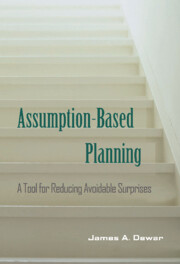Book contents
- Frontmatter
- Contents
- Figures
- Preface
- Acknowledgments
- 1 The essence of Assumption-Based Planning
- 2 A taxonomy of assumptions
- 3 Step 1: identifying assumptions
- 4 Step 2: identifying load-bearing, vulnerable assumptions
- 5 Step 3: identifying signposts
- 6 Step 4: developing shaping actions
- 7 Step 5: developing hedging actions
- 8 The art of conducting ABP
- 9 Beyond ABP as a post-planning tool
- Appendix: Assumption-Based Planning and the planning literature
- Bibliography
- Glossary
- Index
1 - The essence of Assumption-Based Planning
Published online by Cambridge University Press: 29 October 2009
- Frontmatter
- Contents
- Figures
- Preface
- Acknowledgments
- 1 The essence of Assumption-Based Planning
- 2 A taxonomy of assumptions
- 3 Step 1: identifying assumptions
- 4 Step 2: identifying load-bearing, vulnerable assumptions
- 5 Step 3: identifying signposts
- 6 Step 4: developing shaping actions
- 7 Step 5: developing hedging actions
- 8 The art of conducting ABP
- 9 Beyond ABP as a post-planning tool
- Appendix: Assumption-Based Planning and the planning literature
- Bibliography
- Glossary
- Index
Summary
You envision a romantic dinner with a special someone. You are nervous; you want to make sure nothing goes wrong. You make a list of all those steps you need to take to make that special dinner a reality. You keep adding and revising the steps as new eventualities come to mind.
A group of U.S. military officers gathers in 1940 to look into the future to identify events that could plausibly lead to conflict. One of them suggests an air attack by Japan on a U.S. Navy base in Hawaii—a suggestion that is dismissed out of hand.
We cannot know the future perfectly, but we can imagine the future and make plans for it by making some assumptions—or judgments— about what that future could be like. Some of the assumptions we make are pretty likely to come true; others are more vulnerable to uncontrollable and unforeseen events; still others seem quite unlikely. Some of the assumptions are likely to be very important to the success of the plan; others will be more peripheral. Assumption-Based Planning (ABP) is a tool designed for improving the robustness and adaptability of plans—for reducing the number of avoidable surprises in any plan or planning. It is primarily a “post-planning” tool (recognizing that planning is an iterative process) that concentrates on the assumptions in an already-developed plan that are most important to the plan's success and that are most uncertain. Specifically, ABP works to decrease the risks that assumptions represent.
- Type
- Chapter
- Information
- Assumption-Based PlanningA Tool for Reducing Avoidable Surprises, pp. 1 - 13Publisher: Cambridge University PressPrint publication year: 2002

